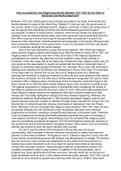-
1. Summary - Tudors' timeline of events
-
2. Summary - Historian criticism on the reigns of henry vii and henry viii
-
3. Summary - Foreign policy timeline of henry vii, viii, edward vi and mary i
-
4. Summary - Historian perspective on the reign of henry viii (alison weir)
-
5. Summary - Edward vi revision questions and answers
-
6. Summary - Edward vi: policies of northumberland
-
7. Essay - How successfully was england governed between 1547-1553 by the duke of somerset and n...
-
8. Summary - Edward vi: religious policies (word doc)
-
9. Essay - Essay: &opencurlyquote;edward vi's reign between 1547 and 1553 represented a crisis for royal auth...
-
10. Summary - Duke of northumberland policies under edward vi
-
11. Summary - Key policies of the duke of somerset under edward vi's reign
-
12. Summary - Elizabeth i: timeline of key events
-
13. Summary - Key information on mary, queen of scots (word doc)
-
14. Summary - Elizabeth i: key government ministers
-
15. Summary - G.r.elton commentary on elizabeth i
-
16. Summary - Elizabeth i: foreign policy table
-
17. Summary - Elizabeth i's childhood influences
-
18. Summary - Elizabethan foreign policies: success + failures
-
19. Summary - Sources of revenue under the reign of elizabeth i
-
20. Summary - Elizabeth i and the spanish armada
-
21. Summary - Was there growing conflict in elizabethan parliament? - historians arguments (word do...
-
22. Summary - The puritan threat to elizabeth i's reign
-
23. Summary - The puritan threat to elizabeth i's reign (word doc)
-
24. Summary - How did elizabeth i use art for politics?
-
25. Summary - Elizabethan government structure (word doc)
-
26. Summary - Elizabeth i: what shaped the religious settlement?
-
27. Summary - Elizabeth i: marriage and succession dilemma
-
28. Summary - Elizabeth i: foreign policy
-
29. Summary - Elizabeth i: economic and social policy
-
30. Summary - Elizabeth i: rebellions and the catholic threat (word doc)
-
31. Summary - Elizabeth i and the spanish armada
-
32. Summary - Elizabethan anglo-spanish relations (word doc)
-
33. Summary - Historian quotes: henry vii
-
34. Summary - Henry vii: trade policies
-
35. Summary - Henry vii revision q+as
-
36. Summary - Henry vii: foreign policy
-
37. Summary - Henry viii revision q+a
-
38. Essay - Exemplar tudor extract analysis
-
39. Summary - Henry viii: additional revision notes
-
40. Summary - Thomas wolsey fact file
-
41. Summary - Thomas cromwell fact file
-
42. Summary - English society under henry viii
-
43. Summary - Economic development under henry viii
-
44. Summary - Crowson's perspective on wolsey
-
45. Summary - Economic development under henry viii (word doc)
-
46. Summary - Class notes on the pilgrimage of grace rebellion
-
47. Summary - Mary i revision q+a
-
48. Summary - Mary i: religious, social and economic policies
-
49. Summary - How beneficial was mary i’s marriage to philip?
-
50. Summary - Mary i: loss of calais
-
51. Summary - Mary i: introduction to her reign
-
52. Summary - How did mary i restore catholicism?
-
53. Summary - Mary i: wyatt's rebellion
-
54. Summary - Historian perspective on mary i
-
55. Summary - Mary i and government ministers
-
Show more




